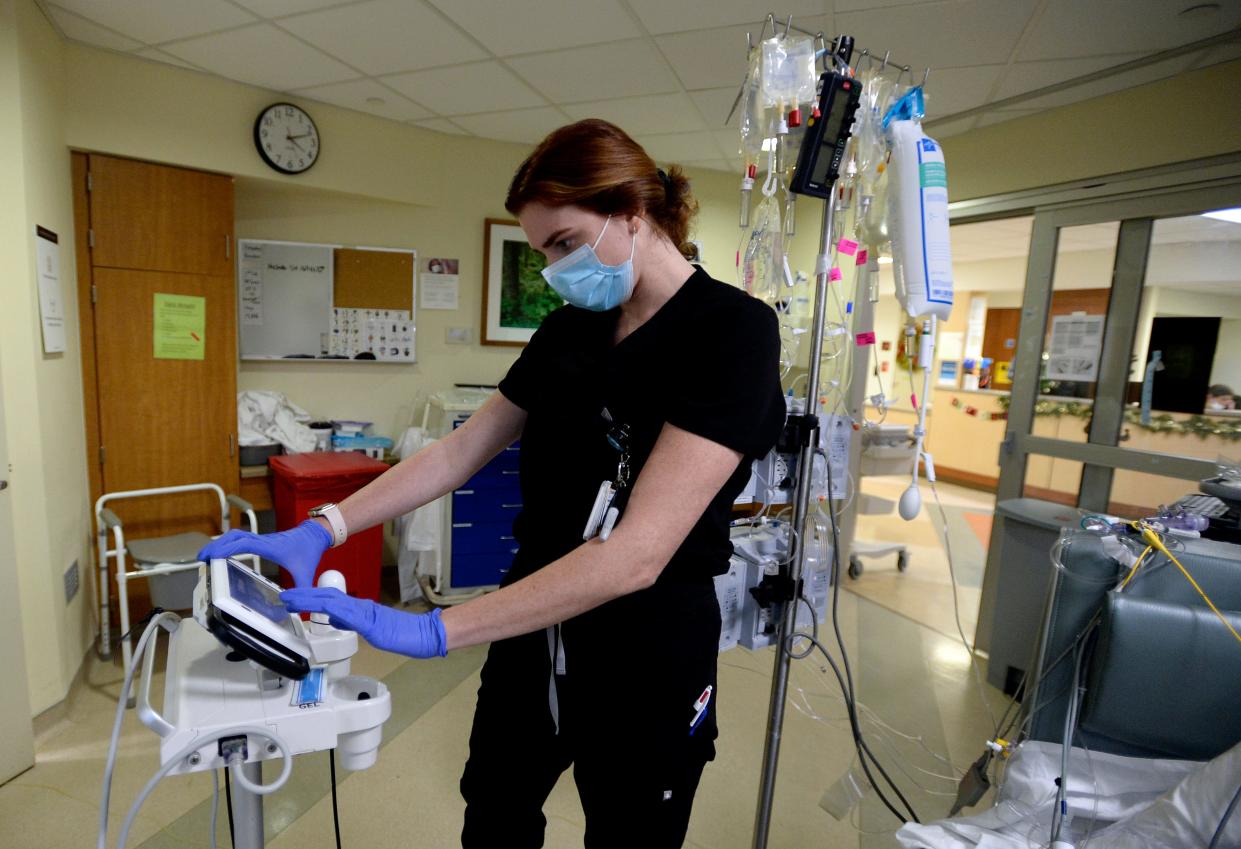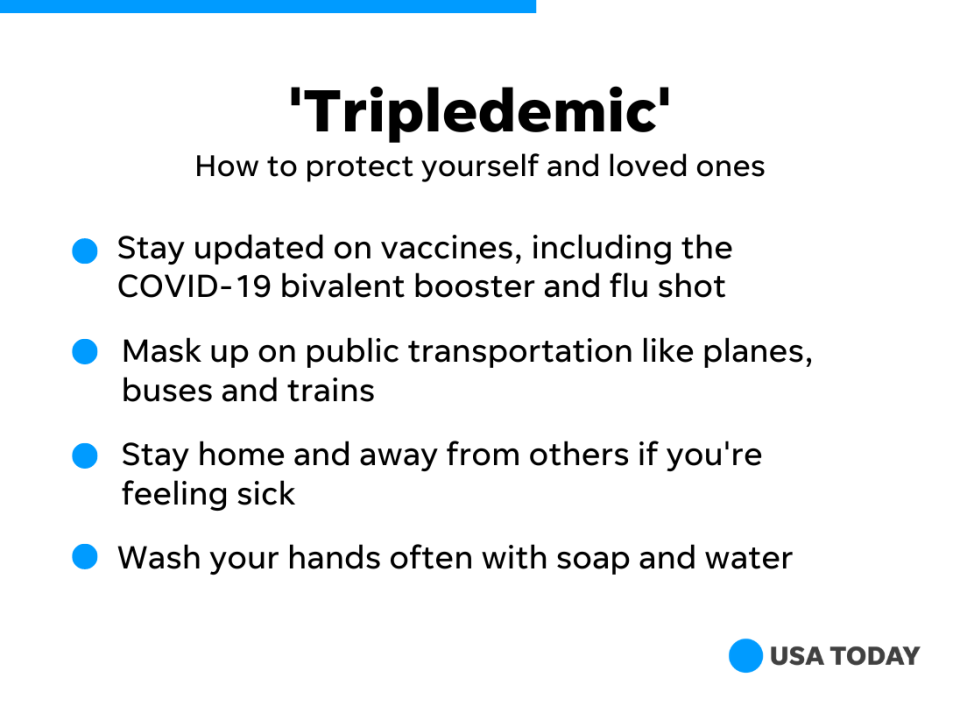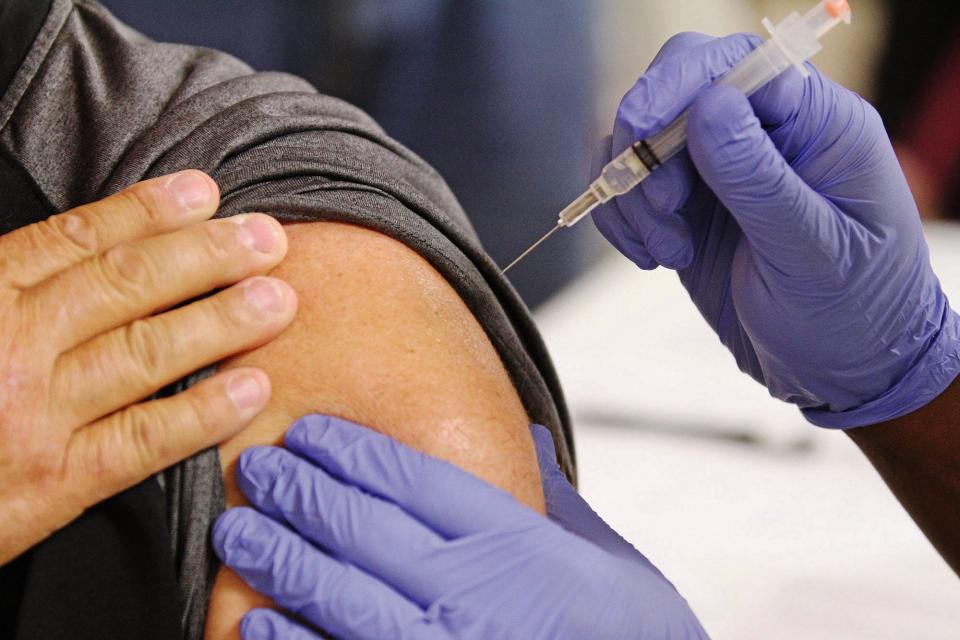What to know about Southern tripledemic 2023: RSV, flu and COVID risks, rates and more

- Oops!Something went wrong.Please try again later.
- Oops!Something went wrong.Please try again later.
Southern states continue to see high numbers of dangerous respiratory infections but have likely passed the worst of the so-called "tripledemic" of influenza, RSV and COVID-19 that led to widespread school closures this fall and has strained some of the region's hospitals.
Meanwhile, COVID-related hospitalizations in Tennessee and throughout the southeast have been at some of the highest levels since the summer — possibly owing to holiday gatherings and colder weather keeping people indoors and in close proximity.
"It was very challenging for hospitals to take care of this influx of respiratory illnesses," said James Antoon, a pediatrician at Monroe Carell Jr. Children's Hospital at Vanderbilt. "We are seeing an uptick in COVID. It seems less likely that we're going to see that true 'tripledemic' of all three viruses at very high circulating levels (at the same time)."
Flu activity levels remain at "high" in Tennessee, Kentucky, North Carolina, Arkansas, Georgia and Alabama, according to the most recent reports from the Centers for Disease Control and Prevention. But that's an improvement over that state's "very high" status in recent weeks. Mississippi remains at that level of flu activity, however.
RSV (short for respiratory syncytial virus), which is responsible for up to 300 child deaths every year in the United States and up to 80,000 hospitalizations, spiked early in Tennessee and the surrounding region but is now retreating after peaking in November, data shows. There is no vaccine for RSV.
Virus severity doesn't seem to be the issue. Rather, it's the confluence of normal seasonal viruses — including this now-third COVID winter — hitting early at some health centers earlier than expected and all at once, said Dr. Amesh Adalja, an infectious diseases specialist and a senior scholar at the Johns Hopkins Center for Health Security.
"This isn't like the bad old days of COVID where people were really at the point of crisis with standards of care," Adalja said. He noted that RSV presented a particular challenge for children's health centers, which were also coping with flu season and continuing cases of coronavirus. "Pediatric hospitals have lower levels of capacity, and there are fewer of them in the country. There were weeks where it was very trying at pediatric hospitals."
Children's hospitals in Memphis and Knoxville reported higher-than-normal patient volumes resulting from RSV. Much of the same was also reported in Kentucky, Mississippi, Alabama and Georgia. Monroe Carell Jr. Children's Hospital at Vanderbilt was also affected but was not overwhelmed, Antoon said.
Alabama's primary children's hospital in Birmingham, Children’s of Alabama, faced long ER waits resulting from a flood of flu and RSV, according to local reports.
"That one definitely felt like a similar strain to what you felt in Tennessee ... making sure we have enough critical care beds to take care of kids that need closer monitoring, and then also ventilators," said Dr. Rachel Lee, an infectious diseases specialist at the University of Alabama-Birmingham. "I think we are doing much better now."
COVID rates in Tennessee rising sharply

According to the Tennessee Department of Health, COVID-related hospitalizations for adults and children are at their highest levels in months.
Last week saw the highest recent peak for adults, with 948 hospitalized throughout the state, including 118 in intensive care units and 46 who required ventilators to breathe. That's more than double the number of such cases seen just in November.
Children's cases also rose last week to 27 COVID-related hospitalizations, state data shows. That's roughly triple the number seen in November.
The seven-day average of new COVID-19 cases in Tennessee is now 1,656, the highest number since early September. This, of course, doesn't take into account those people who don't get tested and/or report their COVID status to the state.
Those showing up to the state's hospital emergency departments with COVID-like symptoms have also been trending upward, with a recent peak of 6.15% of cases on Dec. 25 — the highest rate since August.
RSV and flu: Who's at risk?
For those who are unfamiliar, RSV is a seasonal virus that primarily causes mild, cold-like symptoms in healthy people.
Premature infants and those younger than 6 months are particularly at risk for serious illness, according to the Centers for Disease Control and Prevention. So, too, are those with compromised immune systems, neuromuscular disorders, chronic lung disease or congenital heart disease.
Adults 65 and older are also at risk, particularly those with weakened immune systems and those with chronic heart or lung disease.
While there is no vaccine yet for RSV, they are currently in development.
Health officials predicted this season: Health officials warn of nasty flu season, 'twindemic' this year
Related coverage: Your questions answered: All things COVID-19, flu vaccine safety and efficacy
This year's flu season was considered one of the nastier ones following the experience seen in Australia over the summer.
Flu shot rates for adults throughout the South are lower than the national average of 39.8%, according to the latest CDC figures. Tennessee's rate is 34.8%, according to the CDC. Doctors interviewed for this story say this year's flu vaccines work especially well in preventing illness and hospitalization. Both rates are lower than the previous year.
Those at particular risk from flu complications include people 65 years and older, those with certain chronic medical conditions (including asthma, diabetes or heart disease), pregnant people and children younger than 5 years (especially those younger than 2).
"We're seeing a lot of vaccine hesitancy with influenza shots this year. I think people are tired of shots and the boosters, and there's always this angst about influenza vaccinations," said Dr. Nick Hysmith, medical director of infection prevention at Le Bonheur Children's Hospital in Memphis and an associate professor at the University of Tennessee Health Science Center.
"This year, we saw quite a few adult admissions for influenza and there was a lot of it in the community."
Why a 'tripledemic' this year?

Medical experts interviewed for this story were divided on whether the south indeed suffered a true "tripledemic." Adalja, the infectious diseases specialist at Johns Hopkins, noted that a variety of viral infections are always circulating at any given time.
Others noted that, yes, there was a triple viral threat this season. But, they said, they were thankfully staggered enough to not completely overwhelm hospitals.
All agree that flu season and RSV were unseasonably early. Why?
Adalja said it's possible that many U.S. children who might have otherwise gotten RSV between 2020 and 2022, but were shielded from it due to social distancing and masking, may have been more exposed this year. Similarly, those who had gotten some immunity from earlier infections may have seen their immunity wane during this period.
Though Lee, of the University of Alabama at Birmingham, doubts that's the case in the South, where masking was not such a priority. It remains something of a mystery, she said, noting that there was a similar uptick in RSV cases in July 2021.
"I think it's something we're still learning, how these (viruses) are spread among people and what mitigates that spread," she said. "Why are we seeing it? Why did we see it in the summertime rather than in the wintertime (in 2021)? These are all questions that doctors and epidemiologists are continuing to think about. But I don't think it's related to the fact that we've opened the floodgates by taking off our masks."
Frank Gluck is the health care reporter for The Tennessean. He can be reached at fgluck@tennessean.com. Follow him on Twitter at @FrankGluck.
Want to read more stories like this? A subscription to one of our Tennessee publications gets you unlimited access to all the latest political news, plus newsletters, a personalized mobile experience, and the ability to tap into stories, photos and videos from throughout the USA TODAY Network's daily sites.
This article originally appeared on Nashville Tennessean: How new covid variant, RSV and flu made for a Southern tripledemic

